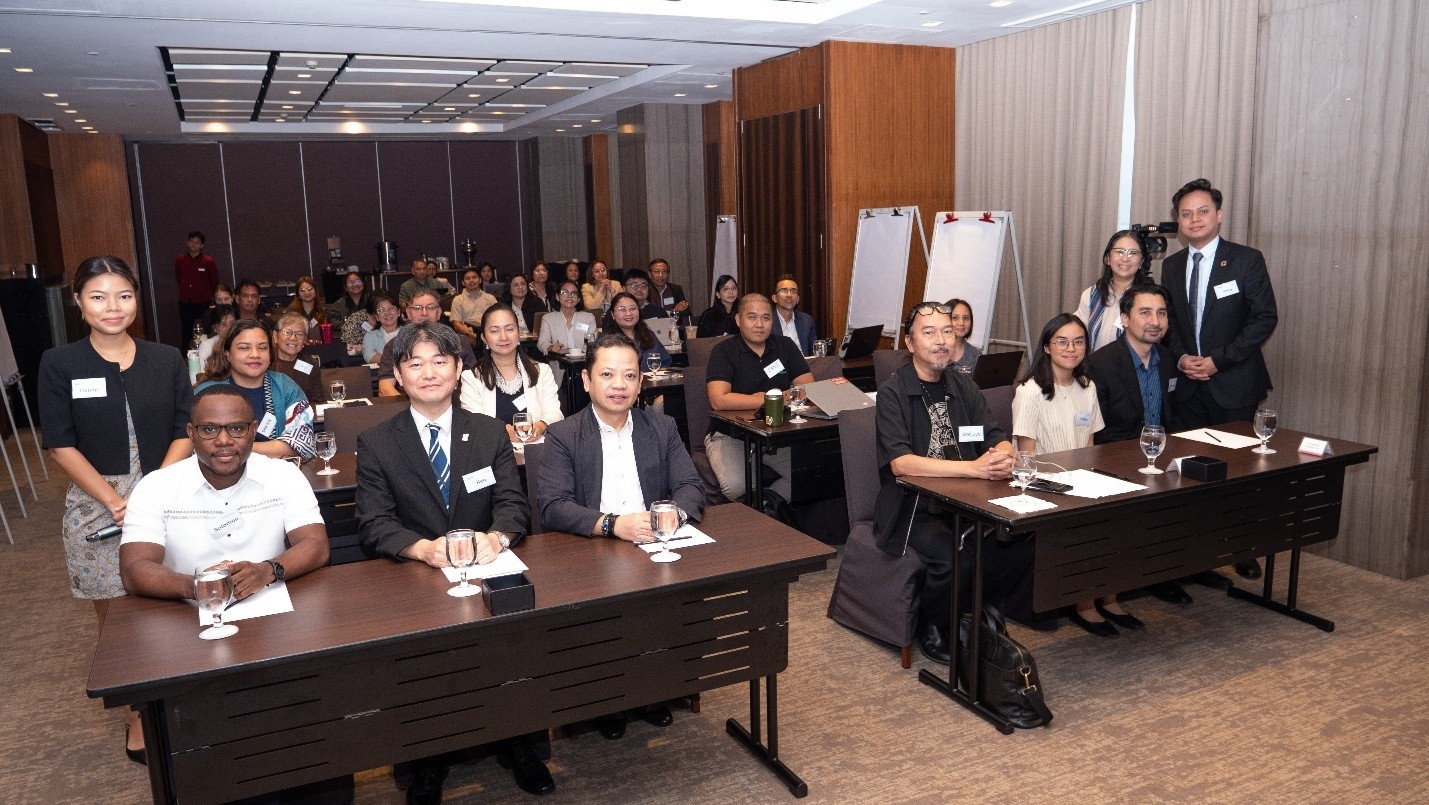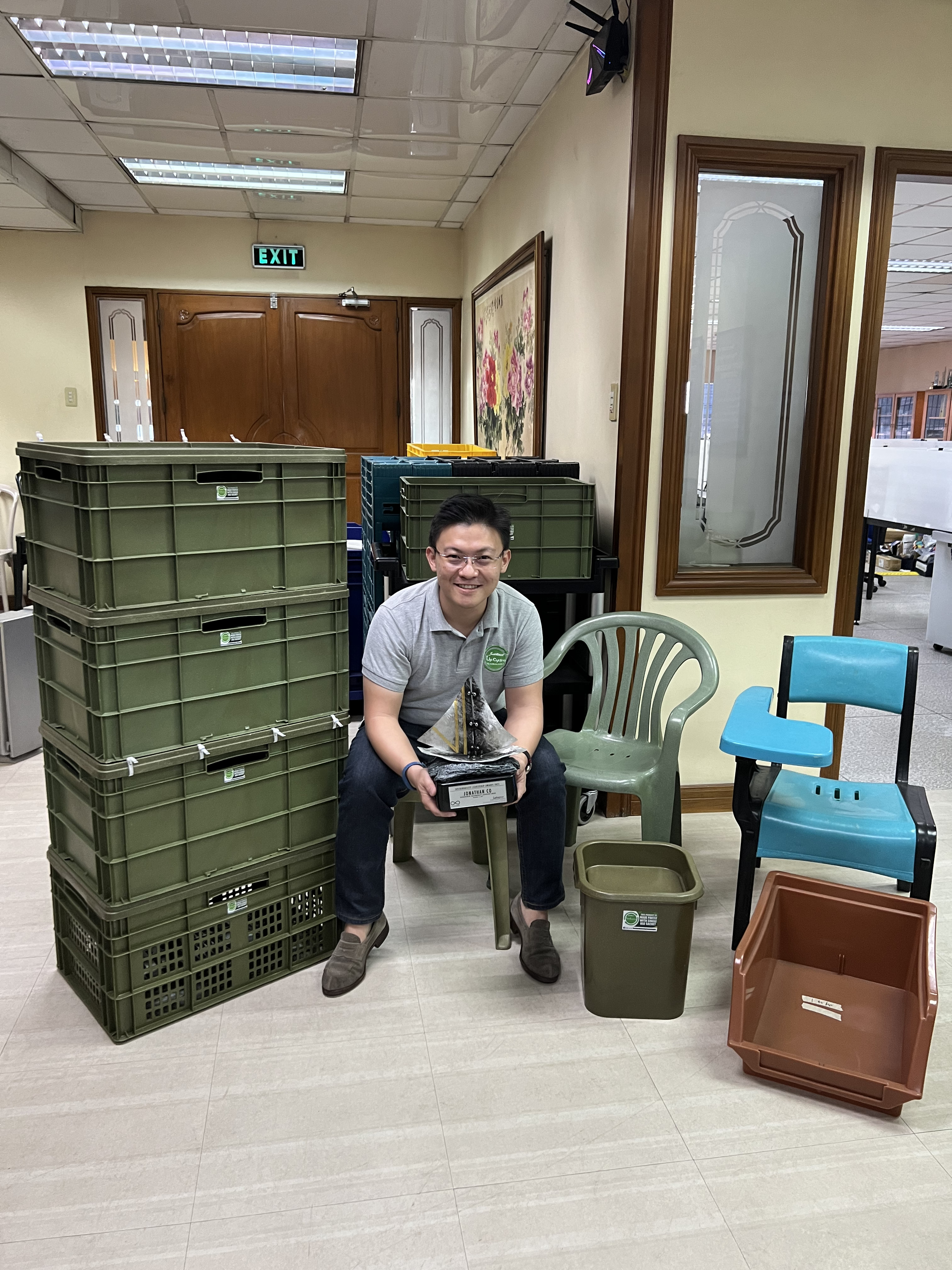

Manila, 30 September 2025: ERIA, through its Regional Knowledge Centre for Marine Plastic Debris, hosted its inaugural capacity-building workshop ‘CIRCONOMICS: Circular Economics for Business Transformation’ at the Marco Polo Ortigas, Manila.
This workshop marked the first in a series of activities aimed at empowering small and medium-sized enterprises (SMEs) in the Philippines to adopt circular business models and integrate sustainable practices into their operations.
SMEs represent over 97% of ASEAN businesses and play a critical role in driving local economies and employment. Yet, many face barriers in adopting circular practices due to limited technical knowledge, financing, and policy support. Recognising these challenges, the Regional Knowledge Centre designed the CIRCONOMICS workshop to equip SMEs with practical tools, knowledge, and partnerships necessary to embrace circular economy models that are both environmentally and economically sustainable.
Welcoming remarks were delivered by Mr Reo Kawamura, Director for Environmental Policy and the Regional Knowledge Centre for Marine Plastic Debris at ERIA, who emphasised the importance of empowering SMEs to drive the transition to a circular and low-plastic economy.
‘The circular economy is not just an environmental imperative – it is also an economic opportunity,’ he said. ‘By embracing circular practices – such as reducing plastic waste, adopting eco-design, recycling, and integrating extended producer responsibility (EPR) models – businesses can reduce environmental impacts, create social value through green jobs and community benefits, and enhance economic resilience by improving efficiency, reducing costs, opening new markets, and building long-term competitiveness.’
Mr Edwin C. Pasahol, Division Chief of the Bureau of SME Development–Programme Development Division at the Department of Trade and Industry (DTI) of the Philippines, emphasised the urgent need for MSMEs to build economic, environmental, and social. He also presented the Green Economic Development (GED) Programme, a government and private sector initiative that promotes sustainable and inclusive economic growth by helping micro, small, and medium-sized enterprises (MSMEs) adopt environmentally friendly and climate-smart practices – one of the government’s key efforts in supporting the green transition.
The workshop combined lectures, hands-on exercises, and interactive discussions, all led by regional and local experts. Mr Indradhi Faisal Ibrahim, Capacity Building Expert at the Regional Knowledge Centre, covered the fundamentals and benefits of the circular economy, highlighting how circular models can reduce costs, boost innovation, and strengthen competitiveness.
Mr Solomon Huno and Mr Bishal Bhari from the Asian Institute of Technology (AIT) provided technical insights on waste reduction, eco-design, and EPR, while Ms Melissa Cardenas of Environweave Philippines guided participants in identifying circular opportunities within their waste streams.
An interactive session on accessing financing and pitching circular business ideas was led by two experts from Villgro Philippines: Ms AC Alyzsa Dy, Head of Incubation and Venture Support, and Ms Malen Maree Horigue, Senior Program Associate. This session encouraged participants to explore funding mechanisms and develop investor-ready circular business proposals.
Participants engaged in a policy dialogue to share challenges and recommendations on addressing regulatory gaps and existing policies, incentives, and support mechanisms needed to help SMEs adopt circular models more effectively. The discussion highlighted the importance of a coordinated policy framework that fosters innovation, reduces barriers to circular transition, and provides incentives for SMEs to participate in sustainable value chains.
The CIRCONOMICS workshop achieved the following outcomes:
Enhanced awareness amongst SMEs of the business and environmental benefits of circular practices;
Improved technical knowledge in plastic waste reduction, eco-design, packaging innovation, and integrating EPR and recycling;
Strengthened connections amongst SMEs, business associations, policymakers, and financing partners for future collaboration; and
Identified insights and challenges to inform the Regional Knowledge Centre’s forthcoming policy brief on enabling environments for circular SMEs.
CIRCONOMICS is part of the Regional Knowledge Centre’s broader effort to build capacity and foster regional collaboration on marine plastic debris reduction and circular economy implementation across ASEAN. By centring on SMEs – often underrepresented in sustainability agendas – the programme supports ERIA’s mission to promote inclusive and practical solutions that advance environmental sustainability and economic resilience in the region.
Manila, 30 September 2025: ERIA, through its Regional Knowledge Centre for Marine Plastic Debris, hosted its inaugural capacity-building workshop ‘CIRCONOMICS: Circular Economics for Business Transformation’ at the Marco Polo Ortigas, Manila.
This workshop marked the first in a series of activities aimed at empowering small and medium-sized enterprises (SMEs) in the Philippines to adopt circular business models and integrate sustainable practices into their operations.
SMEs represent over 97% of ASEAN businesses and play a critical role in driving local economies and employment. Yet, many face barriers in adopting circular practices due to limited technical knowledge, financing, and policy support. Recognising these challenges, the Regional Knowledge Centre designed the CIRCONOMICS workshop to equip SMEs with practical tools, knowledge, and partnerships necessary to embrace circular economy models that are both environmentally and economically sustainable.
Welcoming remarks were delivered by Mr Reo Kawamura, Director for Environmental Policy and the Regional Knowledge Centre for Marine Plastic Debris at ERIA, who emphasised the importance of empowering SMEs to drive the transition to a circular and low-plastic economy.
‘The circular economy is not just an environmental imperative – it is also an economic opportunity,’ he said. ‘By embracing circular practices – such as reducing plastic waste, adopting eco-design, recycling, and integrating extended producer responsibility (EPR) models – businesses can reduce environmental impacts, create social value through green jobs and community benefits, and enhance economic resilience by improving efficiency, reducing costs, opening new markets, and building long-term competitiveness.’
Mr Edwin C. Pasahol, Division Chief of the Bureau of SME Development–Programme Development Division at the Department of Trade and Industry (DTI) of the Philippines, emphasised the urgent need for MSMEs to build economic, environmental, and social. He also presented the Green Economic Development (GED) Programme, a government and private sector initiative that promotes sustainable and inclusive economic growth by helping micro, small, and medium-sized enterprises (MSMEs) adopt environmentally friendly and climate-smart practices – one of the government’s key efforts in supporting the green transition.
The workshop combined lectures, hands-on exercises, and interactive discussions, all led by regional and local experts. Mr Indradhi Faisal Ibrahim, Capacity Building Expert at the Regional Knowledge Centre, covered the fundamentals and benefits of the circular economy, highlighting how circular models can reduce costs, boost innovation, and strengthen competitiveness.
Mr Solomon Huno and Mr Bishal Bhari from the Asian Institute of Technology (AIT) provided technical insights on waste reduction, eco-design, and EPR, while Ms Melissa Cardenas of Environweave Philippines guided participants in identifying circular opportunities within their waste streams.
An interactive session on accessing financing and pitching circular business ideas was led by two experts from Villgro Philippines: Ms AC Alyzsa Dy, Head of Incubation and Venture Support, and Ms Malen Maree Horigue, Senior Program Associate. This session encouraged participants to explore funding mechanisms and develop investor-ready circular business proposals.
Participants engaged in a policy dialogue to share challenges and recommendations on addressing regulatory gaps and existing policies, incentives, and support mechanisms needed to help SMEs adopt circular models more effectively. The discussion highlighted the importance of a coordinated policy framework that fosters innovation, reduces barriers to circular transition, and provides incentives for SMEs to participate in sustainable value chains.
The CIRCONOMICS workshop achieved the following outcomes:
Enhanced awareness amongst SMEs of the business and environmental benefits of circular practices;
Improved technical knowledge in plastic waste reduction, eco-design, packaging innovation, and integrating EPR and recycling;
Strengthened connections amongst SMEs, business associations, policymakers, and financing partners for future collaboration; and
Identified insights and challenges to inform the Regional Knowledge Centre’s forthcoming policy brief on enabling environments for circular SMEs.
CIRCONOMICS is part of the Regional Knowledge Centre’s broader effort to build capacity and foster regional collaboration on marine plastic debris reduction and circular economy implementation across ASEAN. By centring on SMEs – often underrepresented in sustainability agendas – the programme supports ERIA’s mission to promote inclusive and practical solutions that advance environmental sustainability and economic resilience in the region.

Research Associate for Capacity Building


